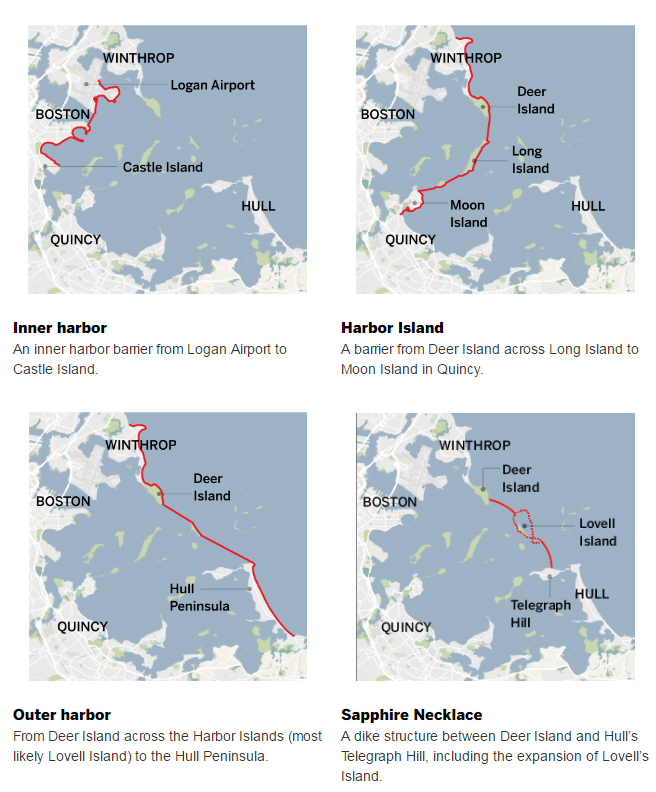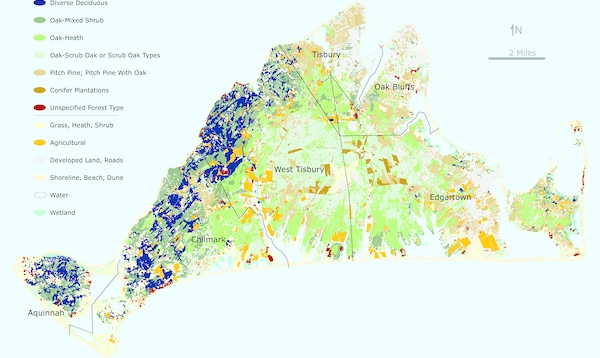Episode 31: Rising Tides

This week, we hear stories of very different places in battle with the sea. We consider a massive and expensive seawall plan that could save Boston, and coastal adaptation in New Hampshire. We speak with the author of a new book about Martha’s Vineyard — the island tourist hub that’s been slowly eroding for 20,000 years. And from the failed attempt to brand Rhode Island with the slogan “Cooler and Warmer,” to the enduring “Live Free or Die,” to the new “West Mass,” we look inside the marketing of New England.
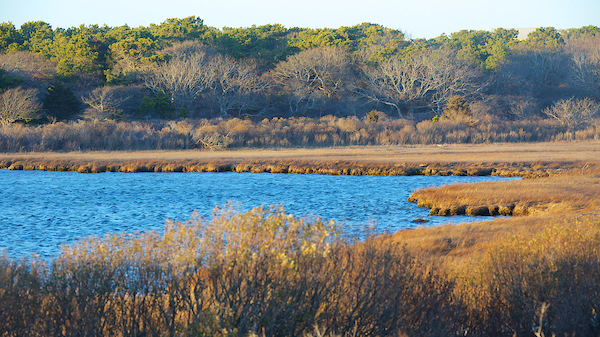
An example of the ecological diversity of Martha’s Vineyard. Adjacent a small pond and inlet on Chappaquiddick, vegetation transitions from salt marsh to shrub wetland and oak and pine forest. Photo by David R. Foster for Harvard Forest Archives, Harvard University
Keeping the Ocean at Bay
Sitting right at sea level, much of the city of Boston is threatened by any rise in the oceans. And with climate change fueling projections of routine flooding – and worse – over the next couple of decades, city officials have begun looking at what to do.
David Abel covers the environment for the Boston Globe. He’s been reporting on the city’s new plan, called Climate Ready Boston, which includes a number of strategies — including a proposal for a seawall that would extend across all of Boston Harbor.
On the New Hampshire Seacoast, planners are considering more subtle ways to prepare for rising seas, including tearing down a sea wall to allow nature to do the job of protecting the shore. From New Hampshire Public Radio, Jason Moon reports.
No Island Is an Island
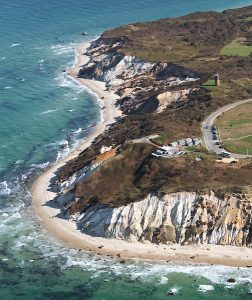
Gay Head cliffs and lighthouse taken in 2011. In 2015, the Gay Head Light was moved back 129 feet due to erosion of the cliffs. Photo by David R. Foster for Harvard Forest Archives, Harvard University
“Relentlessly and unavoidably, Martha’s Vineyard is disappearing.” That’s how Harvard ecologist David Foster begins his new book A Meeting of Land and Sea, Nature and the Future of Martha’s Vineyard.
Foster’s referring there to the rapid rate of erosion on parts of the island, but he writes that a greater threat to the Vineyard’s natural beauty is tourism and development.
Yet he says the island’s six towns have come up with a way to manage that growth, and can offer an example to other parts of New England.
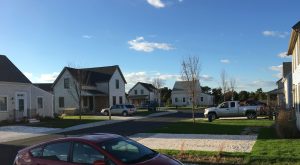
Sachem’s Path is an affordable housing development on Nantucket. Photo by Daniel Richards for the Transom Story Workshop
About six miles southeast of the Vineyard lies Nantucket, an island also known for high-end tourism. On Nantucket, the average house costs $1.2 million. So is there a place for working people to make their homes on the island?
From the Transom Story Workshop, Daniel Richards brings us this story of one woman’s hopes of becoming a homeowner on Nantucket.
Brand Consciousness
The video above is part of a new campaign launched by The Greater Springfield Convention & Visitors Bureau and the Economic Development Council of Western Massachusetts to rebrand the region long known as the “Pioneer Valley” as “West Mass.” The video was released in February, and has become the target of social media mockery and an online petition to scrap the new brand.
Our guest is Connecticut State Historian Walt Woodward. Before becoming a historian, Woodward worked in advertising from 1970 through 1998, creating place-branding campaigns for cities and states around the country. Woodward talks about the struggles and successes of recent branding campaigns in New England, as well as the New England brand itself, an attempt by colonist John Smith to sell this cold, rocky land to folks back home.
NEXT’s home state of Connecticut has had nine different slogans since 1980. The ad below from 2014 riffs off the current state slogan “Still Revolutionary.”
And while “Live Free or Die” has endured in New Hampshire, the state has built on it to create a more cheerful message, like in the video below, which encourages visitors to “Live Free and Climb.”
Do you have thoughts about place-branding, or your own ideas? Tweet us @NextNewEngland.
About NEXT
NEXT is produced at WNPR.
Host: John Dankosky
Producer: Andrea Muraskin
Executive Producer: Catie Talarski
Digital Content Manager/Editor: Heather Brandon
Contributors to this episode: Jason Moon, Daniel Richards
Music: Todd Merrell, “New England” by Goodnight Blue Moon
We appreciate your feedback! Send praise, critique, suggestions, questions, story leads, and complaints next@wnpr.org.

